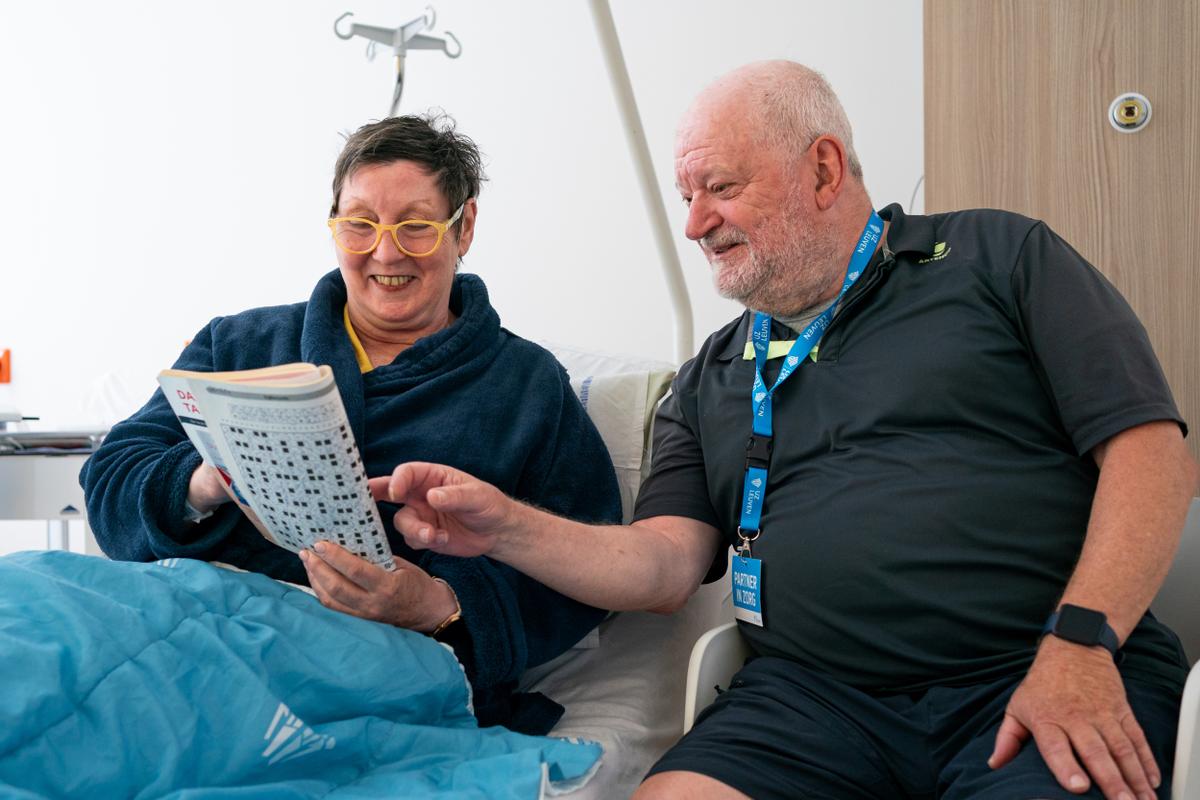Good to know
-
A partner in care can be designated in any adult hospitalisation unit, with the exception of a few special units (for example, intensive care and the overnight stay unit). Always check the visiting policy on the page of the specific ward where you or your loved one is staying.
Partner in care: much more than a visitor
We believe that care is about more than just medical treatments. A familiar face can make a big difference in your recovery process. Additionally, a partner in care can assist with daily tasks (feeding, clearing up after meals, washing, accompanying you to an examination, etc.) or with communicating with the care team.
Discuss with the care team how you can help. They will work with you to see what is possible.
Choosing a partner in care
- When you are admitted to the department, we will ask you if you want to designate a partner in care. This is not mandatory. You can provide this information at a later time as well.
- A healthcare provider will record the name of your partner in care in your file.
- Your partner in care will receive an identification pass, allowing them to stay with you outside regular visiting hours during the day.
Getting started as a partner in care
Agreements
- Please be mindful of the care provided to all patients. Schedule a time with the doctor or nurse to discuss your questions.
- Always consult the care team before assisting with anything, as there may be medical or legal restrictions on what you are allowed to do.
- Respect hygiene and infection control rules.
- Leave the room if the healthcare providers ask you to.
- Respect the privacy and boundaries of other patients and their loved ones.
- Please abide by the general house rules.
Wear your badge visibly
-
Partners in care receive a recognizable badge to wear, allowing hospital staff to distinguish them from other visitors.
Always wear this badge visibly throughout the hospital, including outside the ward.
Take care of yourself
As a partner in care, be mindful of your own limits and well-being:
- Get enough rest and seek support from others.
- Consider staying home occasionally, especially when you feel tired or unwell.
- Ask for clear information about what is expected of you and your role in the care process.
- Communicate what you are comfortable with and what you can manage.
Frequently asked questions
You are free to choose who takes on the role of partner in care, whether it’s a family member, a close friend, or someone else important to you.
No, designating a partner in care is not mandatory.
No, you can provide this information at a later time.
During your admission discussion with the care team, you will be asked if you want to designate a partner in care. If you're unsure at that moment, you can take time to think about it and inform the care team later during your stay.
Yes, in such cases, you can inform the nurse, who will update your file with the new partner in care.
Partners in care can be present during the day. The specific hours will be discussed with you upon admission, and we will note who your partner in care is.
No, for certain examinations, treatments, discussions, or educational sessions, the partner in care may not be present, even with the patient's consent. The healthcare provider will assess whether their presence is appropriate. In other cases, the partner’s presence might be essential. The care team will discuss this with you, but feel free to bring it up if you have any concerns.
What you can and cannot do should always be discussed with the care team. Together, you will determine what is possible. This could include assisting with meals, washing, accompanying them to an examination, or clearing up after meals.
To ensure both your safety and the patient’s, we ask that you always coordinate this with the care team beforehand.
Yes, they can visit during normal visiting hours. During these hours, multiple visitors are allowed. Once visiting hours are over, only the designated partner in care (for that day) may stay.
For patients in palliative care or those in palliative care units, visiting rules are more flexible. Feel free to discuss this with the care team.
No, appointing a partner in care does not grant them access to your medical file.
To give your partner in care access, you need to designate them as your 'trusted person'.
Read more about your patient record and who has access to it.
Yes, but we kindly ask that you respect the care provided to all patients. Schedule a time with the doctor or nurse to discuss your questions. Try to group your questions into one discussion to ensure efficiency.
Yes, in certain situations, such as if the patient is incapacitated, the care team will consult the patient's loved ones to decide who can take on the role of partner in care.
Yes, but in such cases, additional rules will apply. We need to prevent your loved one from being infected (protective isolation) or from infecting others (source isolation).
In both cases, it is important that you as a partner in care:
- Stay in the room.
- Use the call system if you need anything.
- Keep the room door closed as much as possible.
- Avoid common areas (the unit or elsewhere in the hospital).
- Thoroughly disinfect your hands when entering and leaving the room and building.
- Go home immediately after visiting and avoid other areas in the hospital.
Contact
-
Do you still have questions after reading this information? Feel free to contact us at bezoekbeleid@uzleuven.be.
-
For specific questions about your situation, you can also contact the care team of the department where you are admitted.
